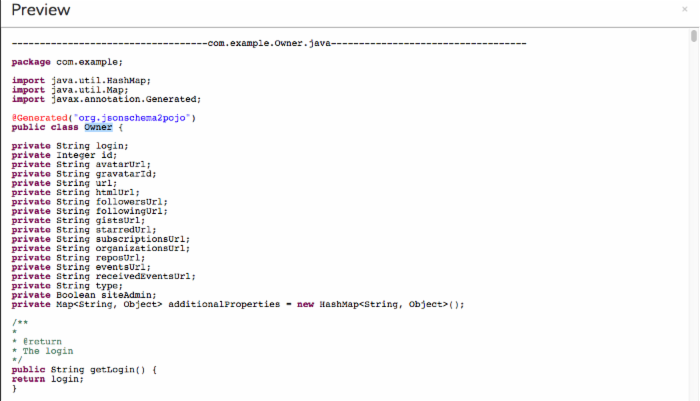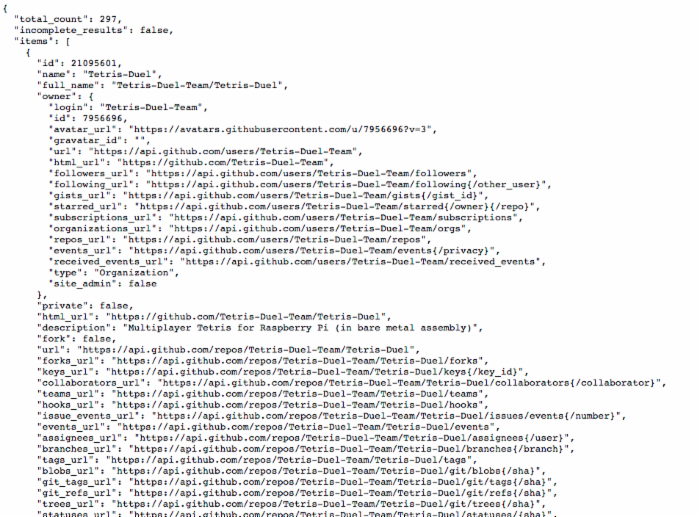使用在线工具jsonschema2pojo根据json生成java对象
如果你还在自己手动写model对象,那你就out了。
场景:使用retrofit请求github的api,要使返回的数据自动解析到java对象中你必须准备好一个和json完全对应的java对象。而github的一个Repository有很多字段,如这个请求:
https://api.github.com/repos/octocat/Hello-World
你可以直接打开这个链接查看返回的json数据。可以看到里面有很多数据项,如果我们手动写这个java对象将非常耗费时间。
所幸现在有了转换的工具。
jsonschema2pojo
jsonschema2pojo 是一个根据json转换成java对象的开源项目,只要把你的json字符串复制到相应的输入框中就能自动将其转换成java对象。它的强大之处在于,能解析列表式的json数据,把嵌套在内层的对象也解析出来。
先以上面的api请求为例,得到的json如下,这是一个单一的Repository数据:
{ "id": 1296269, "name": "Hello-World", "full_name": "octocat/Hello-World", "owner": { "login": "octocat", "id": 583231, "avatar_url": "https://avatars.githubusercontent.com/u/583231?v=3", "gravatar_id": "", "url": "https://api.github.com/users/octocat", "html_url": "https://github.com/octocat", "followers_url": "https://api.github.com/users/octocat/followers", "following_url": "https://api.github.com/users/octocat/following{/other_user}", "gists_url": "https://api.github.com/users/octocat/gists{/gist_id}", "starred_url": "https://api.github.com/users/octocat/starred{/owner}{/repo}", "subscriptions_url": "https://api.github.com/users/octocat/subscriptions", "organizations_url": "https://api.github.com/users/octocat/orgs", "repos_url": "https://api.github.com/users/octocat/repos", "events_url": "https://api.github.com/users/octocat/events{/privacy}", "received_events_url": "https://api.github.com/users/octocat/received_events", "type": "User", "site_admin": false }, "private": false, "html_url": "https://github.com/octocat/Hello-World", "description": "This your first repo!", "fork": false, "url": "https://api.github.com/repos/octocat/Hello-World", "forks_url": "https://api.github.com/repos/octocat/Hello-World/forks", "keys_url": "https://api.github.com/repos/octocat/Hello-World/keys{/key_id}", "collaborators_url": "https://api.github.com/repos/octocat/Hello-World/collaborators{/collaborator}", "teams_url": "https://api.github.com/repos/octocat/Hello-World/teams", "hooks_url": "https://api.github.com/repos/octocat/Hello-World/hooks", "issue_events_url": "https://api.github.com/repos/octocat/Hello-World/issues/events{/number}", "events_url": "https://api.github.com/repos/octocat/Hello-World/events", "assignees_url": "https://api.github.com/repos/octocat/Hello-World/assignees{/user}", "branches_url": "https://api.github.com/repos/octocat/Hello-World/branches{/branch}", "tags_url": "https://api.github.com/repos/octocat/Hello-World/tags", "blobs_url": "https://api.github.com/repos/octocat/Hello-World/git/blobs{/sha}", "git_tags_url": "https://api.github.com/repos/octocat/Hello-World/git/tags{/sha}", "git_refs_url": "https://api.github.com/repos/octocat/Hello-World/git/refs{/sha}", "trees_url": "https://api.github.com/repos/octocat/Hello-World/git/trees{/sha}", "statuses_url": "https://api.github.com/repos/octocat/Hello-World/statuses/{sha}", "languages_url": "https://api.github.com/repos/octocat/Hello-World/languages", "stargazers_url": "https://api.github.com/repos/octocat/Hello-World/stargazers", "contributors_url": "https://api.github.com/repos/octocat/Hello-World/contributors", "subscribers_url": "https://api.github.com/repos/octocat/Hello-World/subscribers", "subscription_url": "https://api.github.com/repos/octocat/Hello-World/subscription", "commits_url": "https://api.github.com/repos/octocat/Hello-World/commits{/sha}", "git_commits_url": "https://api.github.com/repos/octocat/Hello-World/git/commits{/sha}", "comments_url": "https://api.github.com/repos/octocat/Hello-World/comments{/number}", "issue_comment_url": "https://api.github.com/repos/octocat/Hello-World/issues/comments{/number}", "contents_url": "https://api.github.com/repos/octocat/Hello-World/contents/{+path}", "compare_url": "https://api.github.com/repos/octocat/Hello-World/compare/{base}...{head}", "merges_url": "https://api.github.com/repos/octocat/Hello-World/merges", "archive_url": "https://api.github.com/repos/octocat/Hello-World/{archive_format}{/ref}", "downloads_url": "https://api.github.com/repos/octocat/Hello-World/downloads", "issues_url": "https://api.github.com/repos/octocat/Hello-World/issues{/number}", "pulls_url": "https://api.github.com/repos/octocat/Hello-World/pulls{/number}", "milestones_url": "https://api.github.com/repos/octocat/Hello-World/milestones{/number}", "notifications_url": "https://api.github.com/repos/octocat/Hello-World/notifications{?since,all,participating}", "labels_url": "https://api.github.com/repos/octocat/Hello-World/labels{/name}", "releases_url": "https://api.github.com/repos/octocat/Hello-World/releases{/id}", "created_at": "2011-01-26T19:01:12Z", "updated_at": "2015-10-08T07:23:02Z", "pushed_at": "2015-10-02T01:04:21Z", "git_url": "git://github.com/octocat/Hello-World.git", "ssh_url": "git@github.com:octocat/Hello-World.git", "clone_url": "https://github.com/octocat/Hello-World.git", "svn_url": "https://github.com/octocat/Hello-World", "homepage": "", "size": 566, "stargazers_count": 1402, "watchers_count": 1402, "language": null, "has_issues": true, "has_downloads": true, "has_wiki": true, "has_pages": false, "forks_count": 1110, "mirror_url": null, "open_issues_count": 139, "forks": 1110, "open_issues": 139, "watchers": 1402, "default_branch": "master", "network_count": 1110, "subscribers_count": 1747 } 其中有一个数据项比较特殊,那就是owner(在第5行),它的值也是一个对象。我们把这个json放在 http://www.jsonschema2pojo.org/ 网站左边的输入框中,右边的设置请按照图里的来。

其中右边设置的Class name一项默认是Example,表示生成的对象名(最外层)就是Example,因为它无法从json中得知这到底是什么对象。我们这里期望得到的对象名是Repository,可以改成Repository就可以了,或者这里不改,在生成之后的java对象里改。
注意里面还有个owner,它本身也是对象,jsonschema2pojo能把这个对象也解析出来,而这个对象的类名耶就是 Owner 。
我们点击Preview按钮,在弹出的对话框中生成了两个类:

第一个就是Owner,第二个截图没有显示出来,是Repository类(我把Class name改成了Repository)。
而这里的 @Generated ( "org.jsonschema2pojo" )可以直接删掉。
可以想象如此之多的变量如果自己写要花费多长时间。
不过需要注意的是jsonschema2pojo对json字符串的总长度有要求。这样如果你像比如github请求的是一个列表数据比如,那么你得到的json很可能超过长度限制。
比如我们使用github的搜索api发出一个这样的请求:
https://api.github.com/search/repositories?q=tetris+language:assembly&sort=starsℴ=desc

返回的json数据首先打印的是列表长度total_count,这里是297。这是搜索结果的总长度,但是其实这次请求返回的只有30 条,因为这是第一页的数据。但是30条已经很长了,超过了长度限制。
要把这样的json转换成对象必须得找个搜索结果比较短的,我们换成
https://api.github.com/search/repositories?q=codebox+language:java&sort=starsℴ=desc
这个返回的结果只有9项,虽然也很长但是还是没有超过限制。

直接把生成的结果复制到jsonschema2pojo的左侧输入框,把类名改成Repositories,表示这是一个数据集合。
生成的类结构从前面部分就能看出来了,分别是Repositories,items以及Owner,其中items对应的就是刚刚我们的Repository类,这里它只能根据json猜测这个类名是items。然而Class name设置的只是最外层的类名。
我们可以生成之后把items改成Repository就行了。或者有个技巧,把json的items直接改成Repository。
我之所以再举一个搜索结果为列表的例子是为了验证一个列表式的json是否可以直接转换成java类。
总结
可以看到jsonschema2pojo的实用性非常高。










![[HBLOG]公众号](https://www.liuhaihua.cn/img/qrcode_gzh.jpg)

